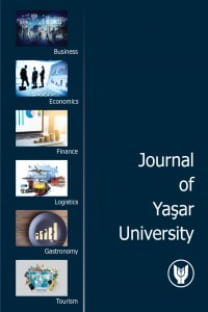RÜZGARSÖRFÜ OKULLARININ TURĠZMDEKĠ ÖNEMĠ: ALAÇATI ÖRNEĞĠ
Rüzgâr sörfü, Sörf turizmi, Alaçatı
THE IMPORTANCE OF WINDSURF SCHOOLS IN TOURISM: THE CASE OF ALAÇATI
Wind-Surfing, Surf tourism, Alaçatı,
___
- İzmir Kalkınma Ajansı (İZKA). (2014) Yarımada Sürdürülebilir Kalkınma Stratejisi 2014-2023, http://www.izmiriplanliyorum.org/static/upload/file/yarimada_kalkinma_stratejisi.pdf
- Barbieri, C. and Sotomayor, S. (2013). Surf Travel Behavior and Destination Preferences: An Application of the Serious Leisure Inventory and Measure. Tourism Management, 35, 111-121.
- Barilotti, S. (2002). Lost horizons: Surfer Colonialism in the 21st Century. The Surfer’s Journal, 11(3), 89–97.
- Buckley, R. (2002). Surf Tourism and Sustainable Development in Indo Pacific Island - The Industry and the Islands. Journal of Sustainable Tourism, 10(5), 405-424.
- Buckley, R. C. (2006) Adventure Tourism, Oxford: CAB International.
- Butts, S. (2001). Good to the Last Drop: Understanding Surfers’ Motivations. Sociology of Sport Online, 4(1), Retrieved 06.01.11 from. http://www.physed.otago.ac.nz/sosol/v4i1/v4i1butt.htm.
- Dalkıran, A. and Bal, E. (2007). Alaçati’da Mekânsal ve Toplumsal Farklılıklar Üzerinde Yükselen Farklı Turizm Eğilimleri. Ege Coğrafya Dergisi, 16 , 53-67.
- Dere, G.K. (2010). İzmir İli Alaçati Beldesinde Sörf Sporu Örneğinde, Spor ve Spor Yerleri Üzerine bir Araştırma. Yüksek Lisans Tezi, Peyzaj Mimarlığı Anabilim Dalı, Ege Üniversitesi.
- Eddie, I. and O'Brien, D. (2013). Benchmarking Global Best Practice: Innovation and Leadership in Surf City Tourism and Industry Development. Global Surf Cities Conference, Australian.
- Espejo, A., Losada, I. J. and Méndez, F. J. (2014). Surfing Wave Climate Variability. Global and Planetary Change, 121, 19–25.
- Krause, S. M. (2012). Pilgrimage to the Playas Surf Tourism in Costa Rica. Anthropology in Action, 19(3), 37–48
- Kurtzman, J. and Zauhar, J. (2001) Virtual Sport Tourism. In Hudson, S. (Ed.), Sport and Adventure Tourism. Haworth Press, Binghamton, NY.
- Martin, S. A., and Assenov, I. (2012). The Genesis of a New Body of Sport Tourism Literature: A Systematic Review of Surf Tourism Research (1997–2011). Journal of Sport and Tourism, 17(4), 257–287.
- Martin, S. A., and Assenov, I. (2014). Investigating the Importance of Surf Resource Sustainability Indicators: Stakeholder Perspectives for Surf Tourism Planning and Development. Tourism Planning & Development, 11(2), 127–148.
- Moutinho, L., Dionısio, P., and Leal, C. (2007). Surf Tribal Behaviour: A Sports Marketing Application. Marketing Intelligence & Planning, 25(7), 668-690.
- Ng , K., Phillips,M.R., Calado, H. , Borges, P., and. Veloso-Gomes, F. (2013). Seeking Harmony in Coastal Development for Small Islands: Exploring Multifunctional Artificial Reefs for São Miguel Island, the Azores. Applied Geography, 44, 99-111.
- O’Brien, D., and Ponting, J. (2013). Sustainable Surf Tourism: A Community Centered Approach in Papua New Guinea. Journal of Sport Management, 27, 158–172.
- Ponting, J.(2014).Comparing Modes of Surf Tourism Delivery in the Maldives. Annals of Tourism Research. 46, 163–184.
- Ponting, J., and O’Brien,D. (2014). Liberalizing Nirvana: An Analysis of the Consequences of Common Pool Resource Deregulation for the Sustainability of Fiji’s Surf Tourism Industry. Journal of Sustainable Tourism, 22(3), 384–402.
- Reichenfeld R. (1991) Windsurfing, Step by Step to Succes, Witsire.
- Robson, C. (2002). Real World Research: A Resource for Social Scientists and Practitioner-Researchers (Vol. 2). Oxford: Blackwell.
- Sönmez, U. (2006). Rüzgâr Sörfünün Yayilmasi Açisindan, Sörf Tüketicisinin Profilinin Belirlenmesi Ve Sörf Okullarinin Önemi. Celal Bayar Üniversitesi, Sağlık Bilimleri Enstitüsü, Beden Eğitimi Öğretmenliği Anabilim Dalı, Sporda Psiko-Sosyal Alanlar Bilim Dalı, Yüksek Lisans Tezi.
- Tantamjarik, P. (2004). Sustainability Issues Facing the Costa Rica Surf Tourism Industry (Master’s thesis). University of Hawaii, HA.
- Yaşar, O. (2014). Bozcaada’nin Su Sporlarindan Rüzgar Sörfü (Windsurfing) ve Uçurtma Sörfü (Kitesurfing) Potansiyelinin Coğrafi Temelleri. Turkish Studies - International Periodical For The Languages, Literature and History of Turkish or Turkic, 9(2) Winter, 1643-1663.
- ISSN: 1305-970X
- Başlangıç: 2006
- Yayıncı: Yaşar Üniversitesi
Türkiye’de Modern Banyonun Değişimi: Dergi Reklamları Üzerinden Bir Değerlendirme
Aysun AYTAC, Sebnem TIMUR OGUT
Türkiye’de Kadınlara Oy Hakkı Verilişinin Dönemin Editoryal Karikatürlerinde Tasviri
Mutlu PEKSAYGILI, Mehmet TUTAN
RÜZGARSÖRFÜ OKULLARININ TURĠZMDEKĠ ÖNEMĠ: ALAÇATI ÖRNEĞĠ
TELEVİZYON REKLAMLARINA YÖNELİK KAÇINMA DAVRANIŞI VE “BAŞKALARININ VARLIĞI”NIN ETKİSİ
Yesim ULUSU, Serap BATUHAN, Hasan SUHER
Reklamlarda Erkeklik: GQ ve Men’s Health Dergilerindeki Reklamların Eleştirel Bir Okuması
Kırılgan Beşlide Satın Alma Gücü Paritesi (SAGP) Hipotezinin Test Edilmesi
